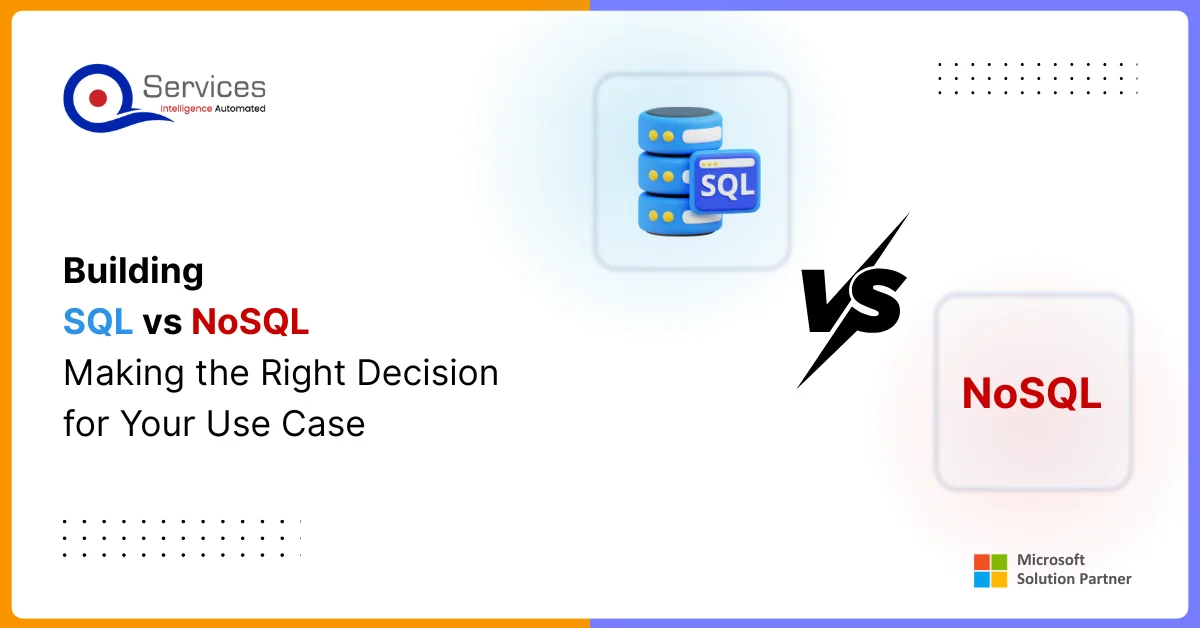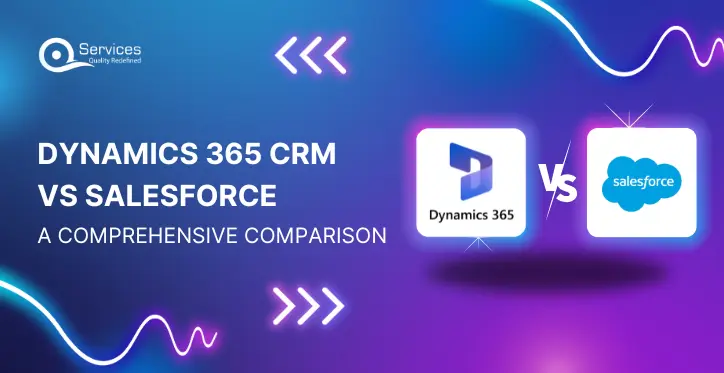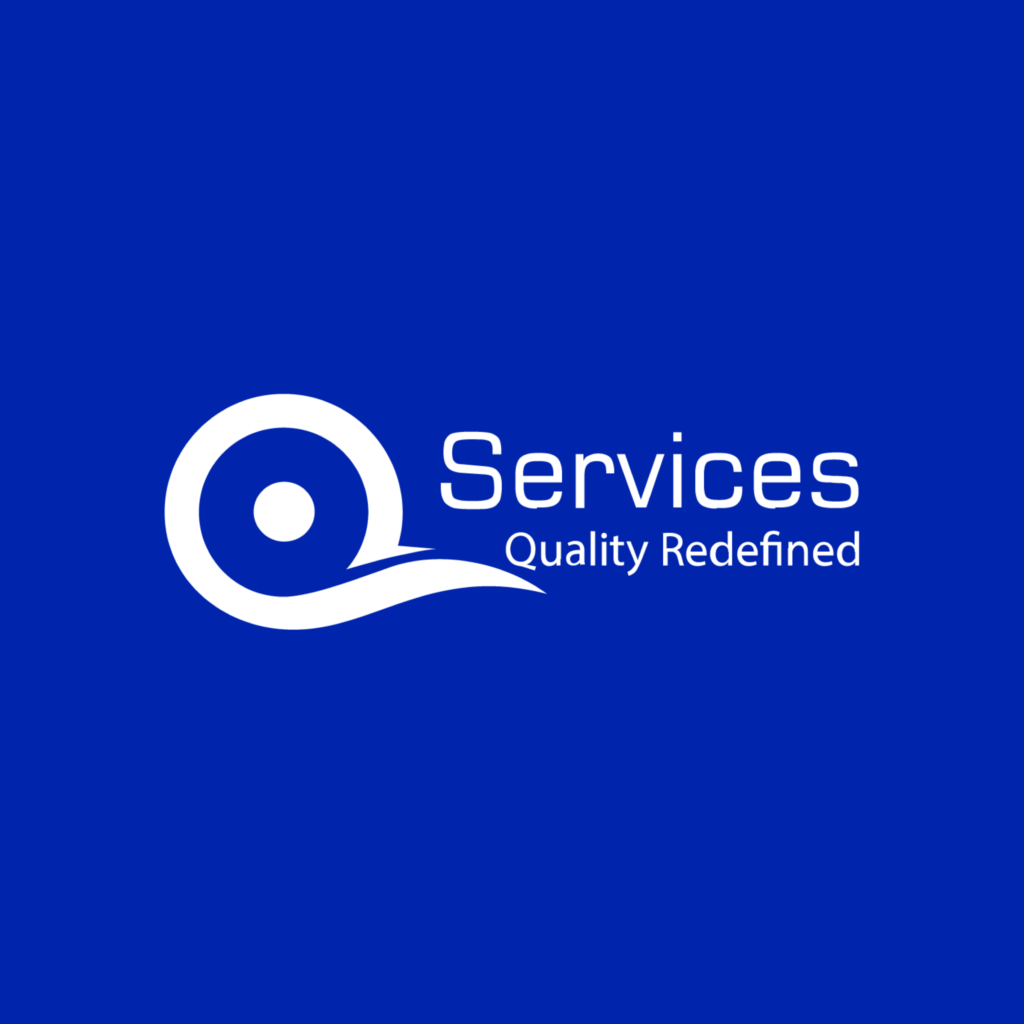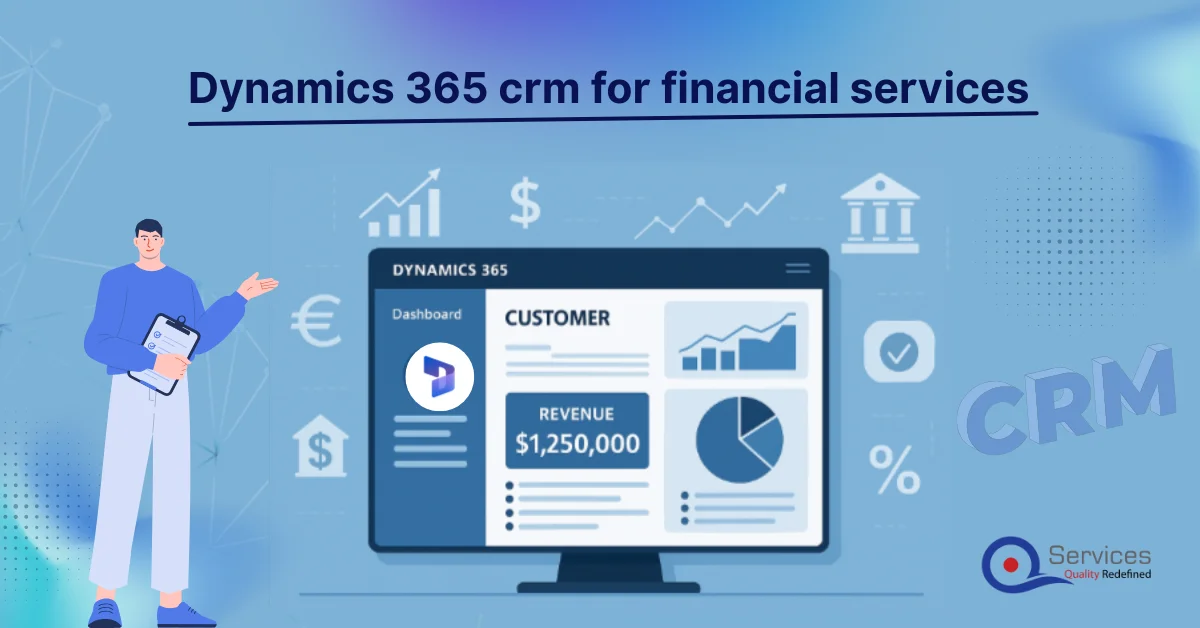
Home » Dynamics 365 CRM vs Salesforce: A Comprehensive Comparison

When we talk about customer relationship management solutions, Microsoft Dynamics 365 CRM and Salesforce are two of the most prominent platforms. Both offer powerful tools for managing sales, marketing, and customer service, but their differences in features, pricing, integration capabilities, and scalability make them suitable for different business needs. This comparison will explore these key differences to help businesses make an informed decision about which CRM solution aligns with their goals.
Both Microsoft Dynamics 365 and Salesforce serve the same core purpose of helping businesses manage customer interactions, but they approach this goal from different angles.

Both platforms offer extensive CRM functionalities, but when comparing Microsoft Dynamics CRM vs Salesforce CRM, the specific features may appeal to different business needs.
Microsoft Dynamics 365 helps businesses manage their sales pipelines by tracking leads, opportunities, and sales activities. This ensures sales teams can focus on the most promising deals and close them efficiently.
Microsoft Dynamics CRM helps businesses automate their marketing campaigns like emails, social media integration, and event management.This helps in reaching the right audience with personalized messages at the right time.
Dynamics CRM offers tools to track customer interactions across different channels, which helps businesses understand their customer behavior and patterns easily.
This feature helps manage customer service cases from start to finish. It includes tools for tracking case status, assigning cases to the right agents, and ensuring timely follow-ups.
Dynamics 365 allows businesses to define and monitor SLAs to ensure that customer service standards are consistently met.
Omnichannel support means that the platform supports several communication channels, providing seamless customer service.
Dynamics 365 helps create, assign, and manage work orders for field service operations. This is particularly useful for industries that require on-site service, such as manufacturing and utilities.
The platform includes tools for optimizing the scheduling and dispatching of field service resources, ensuring that the right technician with the right skills is sent to the right job at the right time.
Unlike Salesforce, Microsoft Dynamics 365 includes integrated Enterprise Resource Planning (ERP) capabilities. This means it can handle financial management, supply chain operations, and other back-office functions within the same platform.
The platform offers tools for managing financial operations, including budgeting, accounting, and financial reporting.
Dynamics 365 provides several comprehensive tools for managing supply chains, from procurement to inventory management to logistics.
Salesforce is also considered a powerful CRM platform that provides a set of tools to help businesses enhance operations in sales, customer service, marketing, and e-commerce. Whether you’re a small startup or a large enterprise, Salesforce can help you manage customer relationships more effectively and drive business growth. Here’s how it works in action:
Sales Cloud is designed to help sales teams manage leads, track opportunities, and forecast future sales. Let’s say you’re a software company looking to grow your customer base.
Imagine you run a marketing campaign that generates hundreds of leads. With Salesforce, you can track each lead from initial contact through the sales process, ensuring none are lost and that the sales team knows which leads to prioritize.
As a lead turns into a sales opportunity, Sales Cloud lets you track its progress in your pipeline. If you’re working with a large retail chain, for example, you can see exactly where each deal stands—whether it’s in the negotiation stage, awaiting final approval, or about to close—and know what actions to take.
Using data from past sales trends, Sales Cloud helps you predict future sales performance. This way, if you see that your team is on track to exceed its goals, you can allocate additional resources or adjust strategies in real time.
Service Cloud makes it easier to provide fast, effective customer support. Let’s say you’re a company selling a complex product, and your customers often have detailed technical questions.
When a customer calls in with an issue, Service Cloud lets you log that interaction as a “case” and track its progress until the problem is resolved. Whether they reach out through email, chat, or phone, you have a complete history of their issue and interactions.
Your customer might first reach out via Twitter, then follow up with a call to your support center. Service Cloud pulls everything into one interface, so your team can provide consistent support no matter which channel the customer uses.
Say you’re a travel agency that gets thousands of customer inquiries about booking status. Service Cloud’s AI can help automate responses to common questions, like “When will my flight be confirmed?” This reduces the workload for your support agents.
Marketing Cloud empowers you to automate marketing campaigns and deliver personalized experiences to your customers. Let’s say you’re an online clothing retailer trying to increase engagement.
If a customer browses your site but doesn’t make a purchase, Marketing Cloud can help it out by automatically send them a reminder email with a personalized offer, guiding them along their buying journey. This ensures you stay top of mind and engage customers at just the right moment.
You’re running a Facebook campaign to promote a seasonal sale. Marketing Cloud helps you track engagement, analyze performance, and measure return on investment (ROI). Along with it you can also interact with customers directly on social platforms, all from within the Salesforce platform.
For an upcoming holiday sale, you can create targeted email campaigns to different segments—one for returning customers, another for those who have shown interest in similar products. Salesforce lets you A/B test email content and see which versions drive the most conversions.
Commerce Cloud provides everything you need to run a successful online store. Let’s say you’re a luxury goods retailer looking to enhance your online shopping experience.
You can easily set up and manage your online storefront, including product catalogs, promotions, and inventory. For example, if you’re launching a new limited-edition product, you can set up a dedicated product page and special pricing, all from within Salesforce.
If a customer frequently browses a specific brand of shoes, Commerce Cloud uses AI to recommend other items from that brand or similar styles. This helps you increase conversions by offering customers products they’re more likely to buy.
Once a customer places an order, Commerce Cloud streamlines the entire order fulfillment process, including inventory management, shipping, and tracking. So, if a customer orders a pair of shoes, you can ensure it’s shipped on time, and they can track their package with ease.
While both platforms have robust sales and marketing capabilities, Microsoft Dynamics 365 is often favored for organizations requiring deep integration with ERP systems, while Salesforce is recognized for its extensive customization and ability to manage large volumes of customer data across various touchpoints.
Get free Consultation and let us know your project idea to turn into an amazing digital product.
When comparing Salesforce vs Dynamics CRM pricing, it’s important to consider the different pricing models and how they can impact your budget based on the features and number of users you need.
Microsoft Dynamics 365 uses a modular pricing model, which means you only pay for the features you need. Here’s a breakdown:
Sales and customer service functionalities of d365 Microsoft CRM start at approximately $50 per user per month
Prices increase if you add more advanced features like field service or finance and operations.
This modular approach can be particularly cost-effective for small businesses, as it allows you to scale your investment according to your specific needs.
Salesforce operates on a tiered pricing model, offering different packages based on the level of features and support:
Intended for larger teams requiring further customisation and integrations; $150 per user per month.
$300 per user per month, which covers sophisticated customization choices and first-rate support.
For small businesses, Microsoft Dynamics can often be more cost-effective, especially due to its modular approach. Salesforce, on the other hand, can become more expensive as you scale up, particularly when adding advanced features or using third-party integrations from the AppExchange.
When it comes to customization and flexibility of Microsoft Dynamics vs Salesforce
Both offer powerful tools, but they cater to different needs and preferences.
Customization: Dynamics 365 is packed with customization options through tools like Power Apps, Power Automate, and Power BI. These tools let you:
Customize how tasks and processes flow within your business.
Build apps that fit your specific business needs.
Use Power BI to get unique insights from your data.
However, there’s a bit of a learning curve, especially if you’re not already familiar with Microsoft’s ecosystem.
Flexibility: Dynamics 365 shines in its ability to integrate deeply with other Microsoft products like Office 365, Teams, and Azure. This makes it a great choice if your organization already uses these tools, as everything works seamlessly together.
Customization: Salesforce is incredibly customizable. It offers:
Flexibility: Salesforce is highly adaptable and supports a wide range of industries and business models. Its cloud-based architecture means it can handle complex and evolving business requirements with ease.
When it comes to integration capabilities, MS Dynamics 365 vs Salesforce: Which CRM Fits Your Ecosystem? Let’s discuss here:
Integration is strongest with Microsoft products, including Office 365, Teams, and Azure. Dynamics also supports third-party integrations via connectors and APIs, but its strength lies in enhancing the Microsoft ecosystem.
On the other side Salesforce provides a highly versatile integration framework, with its AppExchange providing access to thousands of third-party applications. Salesforce is cloud-native and can integrate easily with a wide range of tools beyond the Salesforce ecosystem, making it suitable for businesses with diverse software requirements.
When choosing between Microsoft Dynamics 365 CRM vs Salesforce, it’s important to analyse the merits and demerits of each platform to determine which best fits your business needs. Here’s a detailed comparison:
If your business already uses Microsoft tools like Office 365, Teams, and Outlook, Dynamics 365 fits right in. For example, if your sales team uses Outlook for emails, they can seamlessly sync emails and calendars with Dynamics 365 without any extra hassle.
Unlike Salesforce, which focuses more on CRM, Dynamics 365 comes with solid ERP (Enterprise Resource Planning) capabilities. This means it’s great for businesses that also need to manage things like finance, supply chain, and operations all in one place.
If you need the system to work in a very specific way, Dynamics 365 offers customization options through tools like Power Apps and Power Automate. For example, if you have unique workflows or need to automate repetitive tasks, you can build solutions tailored to your business without a lot of extra effort.
If your business involves field technicians, Microsoft Dynamics has advanced tools for managing field operations, saving time and improving efficiency.
If your team isn’t already familiar with Microsoft products, there might be a learning curve. People used to other CRM systems may need extra time to get used to how Dynamics 365 works.
While you can customize Dynamics 365 a lot, doing so can get costly. Building custom apps or adding advanced features may require more budget and resources, especially if you need help from Microsoft specialists.
Salesforce is very flexible. You can customize it using tools like Lightning Components and Apex code to create features specific to your business needs. For example, if you need a unique sales process or customer portal, you can build it without having to start from scratch.
Salesforce has an AppExchange, a marketplace where you can find thousands of third-party apps that integrate directly with Salesforce. So, if you need additional tools for things like project management, accounting, or marketing automation, you can easily find and add them.
Salesforce is known for automating sales and marketing processes. For example, with Salesforce, you can automate email campaigns based on customer actions, track interactions, and manage leads more efficiently.
Salesforce’s mobile app is user-friendly and powerful. If you have a sales team on the go, they can access CRM data and update records in real-time—perfect for reps who spend most of their time out of the office.
Salesforce can be more expensive, especially if you need advanced features. Higher-tier editions, like Enterprise and Unlimited, come with more customization and support but also come at a higher price tag.
While Salesforce is very flexible, connecting it with tools that aren’t part of the Salesforce ecosystem can be complicated. If you need to integrate it with older systems or non-Salesforce apps, it might take more technical work, and you may need specialized help.
Customizing Salesforce to suit your exact business needs often requires technical expertise. If you want more complex features or workflows, you may need developers to help, which can increase both cost and resource requirements.

Which CRM is Right for Your Business?
When choosing between Microsoft Dynamics 365 CRM and Salesforce, it really comes down to what your business needs most.
If your company is already using Microsoft products like Office 365, Outlook, or Teams, Microsoft Dynamics 365 is a natural fit. It integrates smoothly with the Microsoft ecosystem, making it easy to connect everything you already use. Plus, if you need both CRM (Customer Relationship Management) and ERP (Enterprise Resource Planning) features, Dynamics 365 has you covered with a combined solution, which is a big advantage if you’re looking for a single platform to manage both your customer relationships and back-end operations.
Another great thing about Dynamics 365 is its flexibility. You can choose the modules you need, so you only pay for what you use. This can save you money and give you the exact functionality your business requires.
Salesforce is a strong CRM platform, no doubt, especially if you’re looking for lots of third-party integrations and a big marketplace for apps. However, for businesses that are already deeply embedded in the Microsoft ecosystem and need a solid, scalable CRM solution that also offers powerful ERP capabilities, Microsoft Dynamics 365 is usually the better option.
In short, for an easy-to-use, customizable CRM that works seamlessly with other Microsoft tools, you want a platform that can scale with your business as both a CRM and ERP solution and here Dynamics 365 might be your best bet.

Our Articles are a precise collection of research and work done throughout our projects as well as our expert Foresight for the upcoming Changes in the IT Industry. We are a premier software and mobile application development firm, catering specifically to small and medium-sized businesses (SMBs). As a Microsoft Certified company, we offer a suite of services encompassing Software and Mobile Application Development, Microsoft Azure, Dynamics 365 CRM, and Microsoft PowerAutomate. Our team, comprising 90 skilled professionals, is dedicated to driving digital and app innovation, ensuring our clients receive top-tier, tailor-made solutions that align with their unique business needs.

In an era where technology shifts faster than any corporate strategy can keep up, the real concern for IT leaders is how their organization can leverage Microsoft effectively without disrupting operations. This is where the Microsoft Solutions Partner program becomes relevant.

Hyperautomation and Generative AI are now two of the most talked-about topics in banking automation. Banks are increasingly adopting these technologies to enable seamless, end-to-end operations across financial services.

Dynamics 365 CRM for Financial Services is a specialized version of Microsoft Dynamics 365 Customer Relationship Management (CRM) tailored specifically for the financial services industry. It is designed to help financial institutions, such as banks, insurance companies, investment firms, and wealth management organizations, manage their customer relationships, streamline operations, and enhance service delivery.
Dynamics 365 integrates deeply with Microsoft products, offering robust ERP capabilities and seamless integration with tools like Office 365, Teams, and Azure. On the other hand, Salesforce excels in customization and third-party integrations through its AppExchange marketplace, making it highly flexible for businesses with varied needs.
Dynamics 365 can be more cost-effective for small businesses due to its modular pricing model, where businesses pay only for the features they need. For example, a small business can start with just the sales and customer service modules and scale up as it grows. Salesforce tends to be more expensive, particularly as you move to higher-tier plans with additional features.
Key features of Dynamics 365 include sales automation, customer service, field service management, finance, and operations management. For example, the field service module helps businesses efficiently manage and dispatch field technicians.
Salesforce offers key features such as sales and marketing automation, customer service, analytics, and extensive customization options. Its Marketing Cloud, for example, provides powerful tools for creating personalized customer journeys.
Dynamics 365 offers seamless integration with Microsoft Office products like Outlook, Excel, and Teams, making it the better choice for businesses already using these tools.
Salesforce supports third-party integrations through its AppExchange marketplace, which offers thousands of apps that extend Salesforce’s functionality. These apps cover everything from project management to accounting software.
Both platforms offer robust customer data management features, including data tracking, segmentation, and analytics, ensuring businesses can manage and utilize customer information effectively.
Both platforms are highly scalable. However, Salesforce is often preferred for its flexibility and extensive third-party integrations, making it suitable for growing businesses with evolving needs.
Both Dynamics 365 and Salesforce provide powerful sales automation tools, but Salesforce stands out for its seamless integration of sales and marketing functions.
Salesforce is widely recognized for its powerful lead management and sales pipeline tracking tools, including its Lead Scoring and Opportunity Management features. Dynamics 365 also offers strong sales pipeline management, especially when integrated with its ERP and field service modules, but Salesforce tends to be more specialized in sales and customer engagement.

Founder and CEO

Chief Sales Officer
